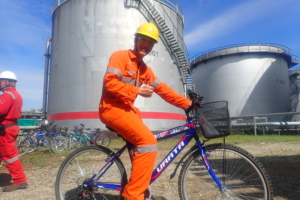Description
Dynamic finite element (FE) modelling of a reciprocating compressor package at an operating asset identified significant skid design deficiencies, which contributed to elevated levels of engine and small bore piping vibration. Vibration measurements and experimental modal analysis were performed to calibrate the FE model, which identified undesirable level of skid vibration in excess of 5 times of the recommended guidelines for reciprocating compressor skids. This result explained the frequent fatigue failures of small bore piping, and other associated reliability issues, such as cracking of piping supports and auxiliary equipment. The poor system reliability led to production deferment and high corrective maintenance cost. The operating asset decided to undertake a project to address the high vibration of these packages. Following a comprehensive assessment, the operating asset landed on a decision to trial the use of tuned mass dampers (TMDs) on one of the recip compressor packages. Following a comprehensive design and analysis phase in conjunction with WOOD, this led to the deployment of the first ever custom-designed TMD for the purpose of mitigating engine vibration on recip compressors. This presentation is intended to provide an overview of the physics of the solution and share the results from the trial of this novel technique in mitigating engine vibration issues.
Bio - Raj Singh
 Raj has over 15 years’ experience working in the field of piping vibration and structural dynamics including mobile mining equipment, gas and water pipelines, gas compression facilities, and power plants. His experience encompasses field measurement and troubleshooting, advanced modelling and solutions for management of structural health, and piping and instrument tubing vibration risk in Oil and Gas facilities. He has a Ph.D. in Mechanical Engineering and is currently a service line manager within the Wood’s Consulting business in Australia.
Raj has over 15 years’ experience working in the field of piping vibration and structural dynamics including mobile mining equipment, gas and water pipelines, gas compression facilities, and power plants. His experience encompasses field measurement and troubleshooting, advanced modelling and solutions for management of structural health, and piping and instrument tubing vibration risk in Oil and Gas facilities. He has a Ph.D. in Mechanical Engineering and is currently a service line manager within the Wood’s Consulting business in Australia.
Bio - Ian Ty Cheong

Ian Cheong is a Senior Static and Materials Engineer, and a piping vibration and fitness for service SME. Primarily responsible in the assurance of pressure equipment integrity activities in the mechanical static discipline. He has significant experience in establishing small-bore piping vibration management programs in operating assets, which delivered a significant improvement in process safety performance and asset reliability. He is highly experienced in vibration analysis, metallurgical failure analysis, and finite element modelling in the context of pressure equipment fitness for service. Ian’s main area of interests are the use of new technologies to improve delivery of safer operations, digitalization and data science in the context of pressure equipment integrity management, and new/novel techniques in the area of vibration and dynamics.
